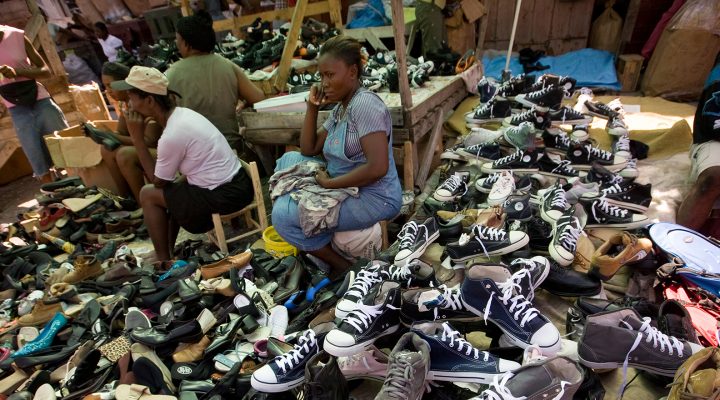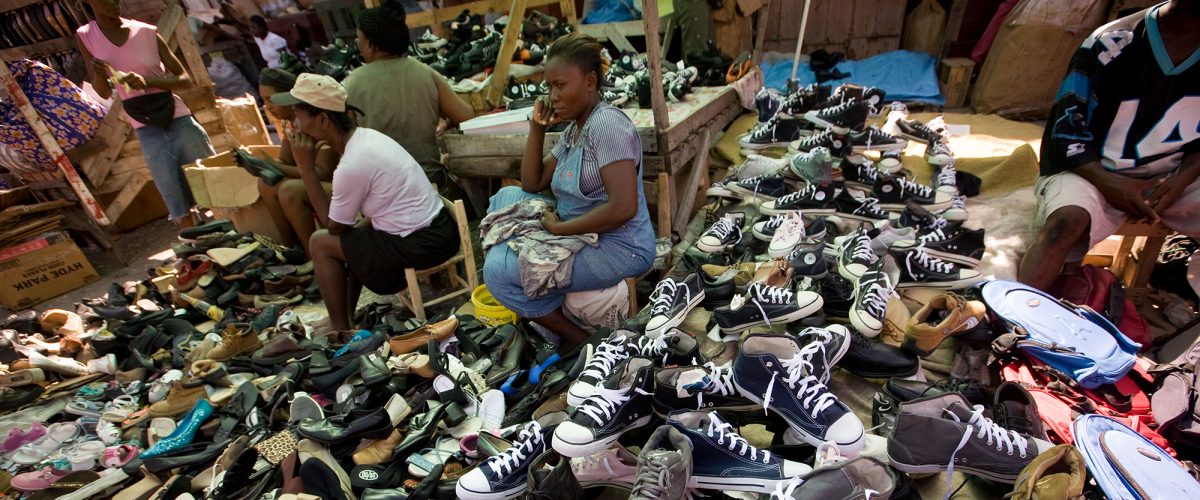Last month, controversy around the true nature of former NFL football player Michael Oher’s relationship with his adoptive family, depicted in the 2009 movie The Blind Side, reignited a conversation around “white saviorism” — the tendency for privileged white Westerners to put themselves in the role of “rescuing” non-white people.
With Oher’s story still in the headlines, HBO is airing Savior Complex, a three-part documentary about Renee Bach, an American missionary who, at the age of 19, went to Uganda, established an NGO and was accused of causing the deaths of more than a hundred children to whom she administered medical treatment. HBO is promoting the series, which airs beginning today, with the question: “Are good intentions good enough?”
While a synopsis for the HBO series says it interrogates “the wider questions around ‘white saviorism’ and the ethics of foreign aid work done in the name of humanitarian and religious ideals,” it isn’t yet clear if the documentary will focus on the damage that, too often, is the end result of well-intentioned mission work or will — as the Ugandan advocacy group No White Saviors speculated in a Sept. 15 statement on X — give “central voice and sympathy to white woman fragility tears.”
American Christians are susceptible
If white saviorism is rooted in the compulsion to share knowledge or power that is perceived to be superior, then American Christians are particularly susceptible to the trope and corresponding pitfalls. Conviction of possessing the only truth and having a God-given commission to share it with the world — with an added dash of American exceptionalism — makes mission work at home and abroad seem like a clear, what-could-go-wrong directive.
The calculus around who gains or who loses when (mostly) white people set out to “help” (mostly) non-white individuals is more nuanced and complex than most well-intentioned would-be do-gooders ever fully comprehend.

Rudy Bazin
According to Rudy Bazin, a native Haitian and partner advocate for Praying Pelican Missions — a group that organizes international missions trips — intentions are a starting point in contemplating potential service work.
“Check your motives for serving,” said Bazin, who now lives in Jackson, Miss., with his wife and children. “If your motive is: ‘it makes me feel good to do this,’ keep your service to yourself, keep your money to yourself.”
“If your motive is: ‘it makes me feel good to do this,’ keep your service to yourself, keep your money to yourself.”
Bazin believes the dignity of the people being served should be the primary focus.
“If you respect me, you will help me see my worth and value,” he said. “If you’re not just using me for the sake of making yourself feel good, you will remove yourself and your interest in your service to me and allow me to rise above my circumstances.”
Life saving at a cost
During his upbringing in Haiti, Bazin often was the beneficiary of mission efforts. He credits that service with changing his life and the lives of his family and community, but he says it came at a cost.
He recalls hearing people speak of their service to him using “shameful” language he wanted to disassociate from. He didn’t want people to know it was him the missionaries were talking about because the words they were using didn’t make him feel he had value in that point in his life.
“The words they use are not words that will lift me up; it’s words that are lifting them up.”
“It’s rather words that are 100% making them feel like they had done something great for the world or for me, and doing it in my expense,” he explained. “The words they use are not words that will lift me up; it’s words that are lifting them up.”
Foils for our betterment?
Upon returning from my first mission trip to Africa in 2000, I told a friend about a visit to the one-room tin home of an African peer and the realization that she had no access to resources I took for granted. I expressed concern this woman might not have the opportunity to live out her full potential and purpose.
“Perhaps,” my friend said, “her purpose was for you to realize that.”
This idea, that human beings on other continents would exist simply as foils for the spiritual betterment of white Americans, reflects a harmful element of inequality Bazin observes in many mission efforts.
Effective mission partnerships depend on viewing those being served “as someone that is of value, someone that is somewhat (on the) same level as you somewhere in your life,” he said. “You will never be friends with someone you regard as being less than you. You will always see this relationship where you [are] up here and they are there.
“You will never be friends with someone you regard as being less than you.”
“This is what is super wrong with our mission movement, where the people going thinking they are above.”
Viewing those on the receiving end of a mission effort as also having something of value to offer is a mental shift that enables missions to operate on a premise of empowerment over dependency. Bazin said the attitude should be, “Hey, I’m coming to help empower you to rise above your situation so you can in turn go around and empower someone else.”
When missionaries keep returning to the same location, he said, “a never-ending cycle of mission going” can develop that hampers the community. “If you are serving a group for a long time and they still can’t even begin thinking about themselves being able to go and serve others, you should really question your service to them and your approach to them or your approach to serving that group.”
Missions dependency
Bazin has witnessed what he calls “a spirit of dependency” that can arise in communities where locals feel like they need the help and “forget to push themselves to a place where they can potentially help themselves and not only help themselves, but also turn around and help someone else.”
In these circumstances, “the mission group has a hold on that community where they are unable to see past their needs,” he said. “They are unable to see the potential they have within themselves to eventually rise above their situation and see not just themselves but others.”
The complacency inherent in this mission model has economic implications that benefit just one party — the American mission organization. Mission groups “often make their living” by leaning into a spot that “can be marketed well,” Bazin said.
And going to the same place over and over is easier than establishing hard work in new places, he added. “It’s easier to be comfortable in the same spot.”
The lonely shoe seller
Mission organizations that create stable economic models through such an approach often do it at the expense of the local economy. I saw a glimmer of stifled Haitian industry once, in a rural Haitian dry goods shop stocked with some of the sturdiest and best-looking children’s shoes I ever have seen. Someone from the mission group I was traveling with commented that the shoemaker “must be the richest man in Haiti.” The clerk at the store was quick to set her straight, explaining the difficulties of selling new shoes at a sustainable price in a market flooded with free American castoffs.
The clerk at the store was quick to set her straight, explaining the difficulties of selling new shoes at a sustainable price in a market flooded with free American castoffs.
I instantly thought of the heaps of clothing I’d seen teams leave behind each of the six times I went to Haiti. We were always instructed — by Haitian and American leaders alike — to leave our clothes behind. The act was billed as a generous kindness. But the well-crafted Haitian-made shoes made me see the dependency cycle that caused Haitians to want the castoffs despite the ways the donations hinder their own development.
The hobbled Haitian clothing industry is not an ill that can be placed solely at the feet of American missionaries. Haitian American author Edwidge Danticat writes in her memoir Brother, I’m Dying about the thriving clothing business being shuttered in the 1960s as a result of a pipeline of used clothing dubbed “Kennedys” because they were sent during JFK’s administration.
Whether through religious or governmental channels, dumping unsolicited American hand-me-downs on a poor nation falls under the umbrella of what writer Teju Cole calls the White Savior Industrial Complex.
Rise of the mission trip
White saviorism has been aided by changes in the nature of mission work in recent decades, Bazin explained. What used to be something a few people did as their life’s work has become what Caroline R. Nagel, professor of geography at the University of South Carolina, calls a teenage “rite of passage in some corners of Protestant Christianity.”
In a June 2023 article for The Conversation, Nagel wrote, “According to some estimates, as many as 2 million youth and adults per year participated in Christian mission trips before the pandemic, including overseas trips and trips to poor communities at home.”
Groups like Teen Mania, and their predecessor, Teen Missions International, played a significant role in normalizing teen mission trips throughout the 1990s and early aughts. Teen Missions International was founded in 1970. According to their website, they have taken about 50,000 North American teens to 100 countries since 1971 and are still operational today. Teen Mania’s Global Expeditions, which ceased operation in 2005, took 75,000 teenagers to 67 countries, and preached the power of short-term missions to an estimated 3 million teenagers at their Acquire the Fire events, according to a 2005 article in Christianity Today.
“Teenagers overwhelmingly reported feeling changed by their mission experiences but did not tend to label the poverty they witnessed as social injustice.”
Nagel’s research revealed teenagers overwhelmingly reported feeling changed by their mission experiences and becoming more aware of their own privilege. But she also found the young adults she interviewed did not tend to label the poverty they witnessed as social injustice.
“The focus on spiritual fulfillment means these young people may be missing out on opportunities to deepen their understandings of the world and to build solidarity with the communities they visit.,” she surmised.
Authentic missions is not just about “saving somebody,” Bazin added. “What I think the goal ultimately is, is for us to come and do life together, break bread together and be in relationship and allow for your faith to be strengthened by mine and mine to be strengthened by yours.”
Despite its pitfalls, Bazin still believes in the missions movement. Praying Pelican, the mission organization he has served with for the past 11 years, is taking the time to have important conversations and is shifting its focus toward equipping locals to serve others.
“God didn’t just call the white Americans to serve his church,” he said. “God called his people. There are good ways to do this. There has to be a culture shift in this movement because right now it’s very white-American centric and it’s so wrong.”

Cynthia Vacca Davis
Cynthia Vacca Davis teaches English at Virginia Wesleyan University. She is also a longtime journalist, writing about community news and faith for several outlets in the Hampton Roads area. She’s the author of Intersexion: A Story of Faith, Identity and Authenticity from Lake Drive Books. Learn more at cynthiavaccadavis.com or on Instagram @cynthia_vacca_davis.
Related articles:
Stuffing shoe boxes for the world’s poor? Maybe you should reconsider
Rethinking that mission trip to Guatemala: advocating for justice, especially in light of U.S. complicity | Opinion by Susan Shaw


